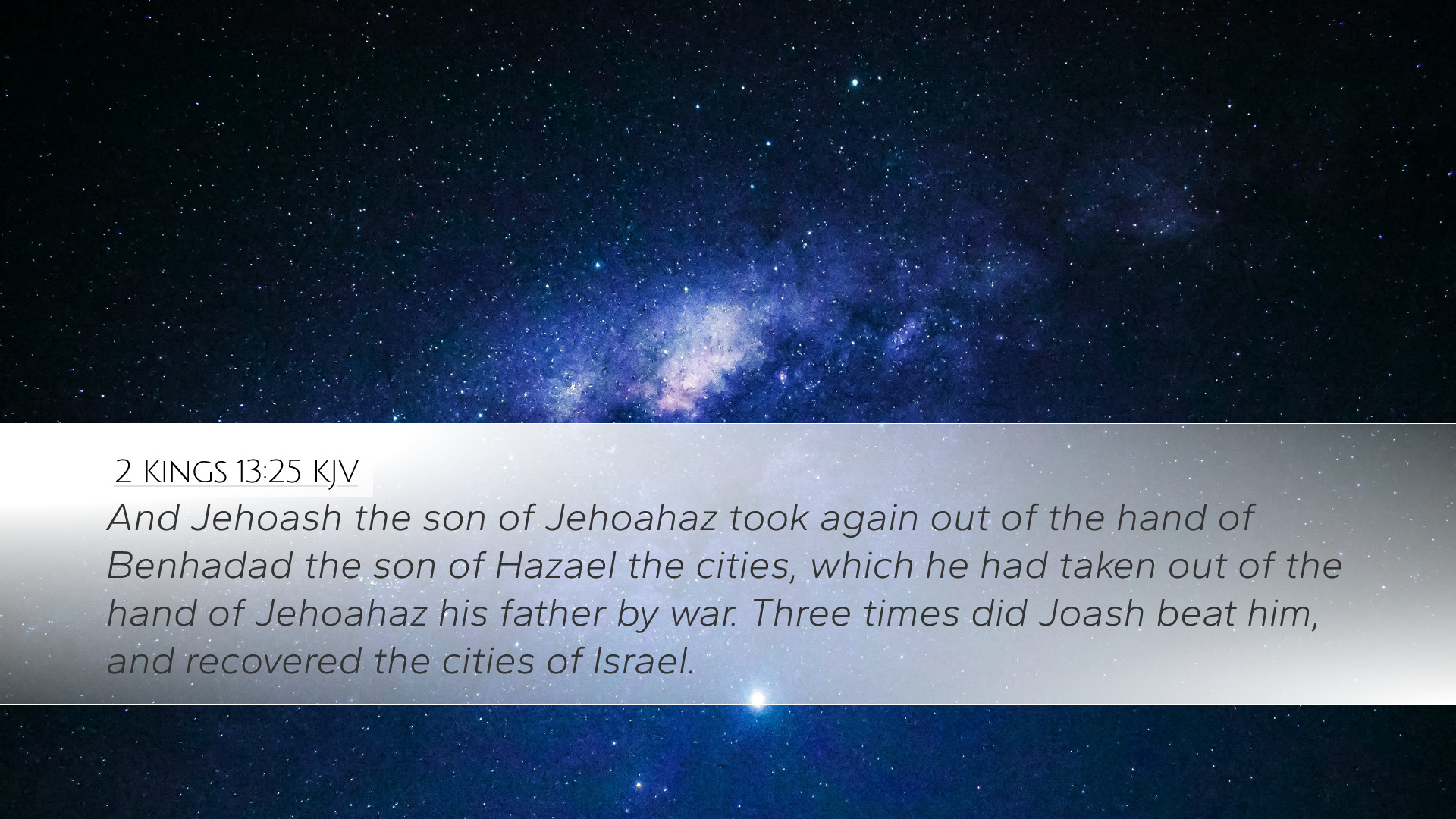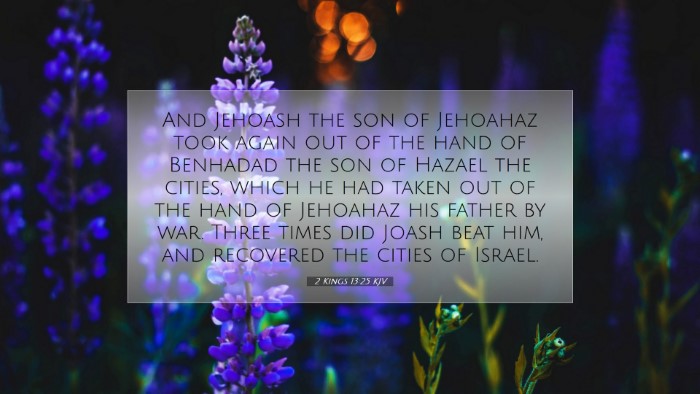Commentary on 2 Kings 13:25
Verse Context: 2 Kings 13:25 states:
"And Jehoash the son of Jehoahaz took again out of the hand of Benhadad the son of Hazael the cities which he had taken out of the hand of Jehoahaz his father by war. Three times did Jehoash beat him, and recaptured the cities of Israel."
Introduction
This verse encapsulates a significant moment in the history of Israel, reflecting on the conflicts between Israel and Syria and the fluctuating fortunes of Israel's kings. The account of Jehoash's victories presents a vital point in the larger narrative of the northern kingdom's battles against external enemies and serves as a reminder of God's providence in the affairs of His people.
Historical and Theological Background
The reign of Jehoash, also known as Joash, is a pivotal point in the history of the divided monarchy. He followed in the footsteps of his father, Jehoahaz, inheriting a nation weakened by idolatry and oppression. His victories against Benhadad signify not just military success, but a restoration of Israel's strength and a temporary relief from the threats posed by surrounding nations.
Insights from Matthew Henry
Matthew Henry comments on the significance of Jehoash recapturing cities as a symbol of God's favor and restoration of Israel's power. He notes:
- God's Intervention: Henry emphasizes that the victories of Jehoash were not solely due to military prowess but were a result of divine intervention.
- Symbolism of the Cities: The cities taken back represent not just physical territories but the spiritual and political integrity of Israel.
- Lessons on Leadership: Henry draws attention to the importance of righteous leadership, suggesting that Jehoash's victories came in context of turning back to God, even if his reign did not fully reflect that commitment.
Insights from Albert Barnes
Albert Barnes offers a detailed look at the implications of the military outcomes described in this verse:
- Historical Backdrop: He emphasizes the historical context of the ongoing conflicts with Syria and the impact of these battles on the kingdom of Israel.
- The Three Victories: Barnes notes that these victories, while significant, did not mark the complete deliverance of Israel but a temporary triumph, suggesting that God's plans often unfold gradually.
- National Revival: He argues that Jehoash's success served as a rallying point for the nation, possibly stirring a semblance of revival among the people of Israel.
Insights from Adam Clarke
Adam Clarke adds layers to the understanding of the passage by stressing its implications for the characters involved:
- Character of Jehoash: Clarke highlights Jehoash's character as complex, noting that his achievements were marred by a lack of true faithfulness to God.
- Benhadad’s Threat: He analyzes Benhadad’s position as a recurring foe, representing the ongoing spiritual battles that Israel faced.
- Importance of Prayer: Clarke asserts that prayer played a crucial role in these victories, reflecting a biblical principle that triumphs come from reliance on divine assistance.
Theological Reflections
As one reflects on 2 Kings 13:25, several theological themes emerge:
- Divine Sovereignty: The theme of God’s control over nations and kings is explicit. The outcomes of battles are portrayed as under God’s authority, suggesting that no earthly power can ultimately thwart His plans.
- Restoration and Judgment: While Jehoash experiences military success, these victories also serve as a reminder of the ongoing need for repentance and alignment with God’s will to sustain blessing.
- Hope Amidst Struggle: The victories of Jehoash provide a glimpse of hope to a nation fraught with spiritual decay, suggesting that even in times of crisis, God’s purposes can prevail.
Conclusion
In summary, 2 Kings 13:25 offers a rich tapestry of historical, theological, and practical insights. Jehoash's victories carry implications that extend beyond mere military success; they invite deeper contemplation on the character of leadership, the necessity of divine favor, and the importance of steadfast faith amidst adversity. For pastors, students, and theologians, this passage serves as a call to recognize God’s sovereignty in all circumstances, challenge them to reflect on the spiritual state of their own nations, and encourage prayerful dependence upon God in the pursuit of justice and righteousness.


